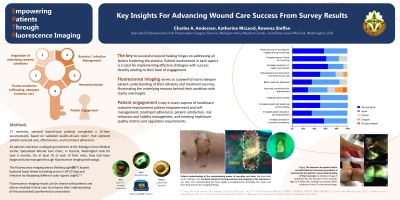Clinical Research
(CR-005 (RPT-005)) Patient Engagement and Satisfaction are Enhanced by Incorporating Fluorescence Imaging into a Wound Care Practice

Ensuring adherence to treatment through patient empowerment is pivotal for healing chronic wounds. Enhanced value-based evaluations, exemplified by Press Ganey and the Patient Experience of Care Domain Scores in HCAHPS, show a positive correlation with heightened patient engagement, underscoring the influence of improved healthcare experiences on patient involvement. Meanwhile, clinical trials substantiate the efficacy of fluorescence (FL) imaging in enhancing treatment outcomes. Our pilot survey seeks to collect data on patient perspectives of FL imaging, investigating its link to overall satisfaction and engagement.
Methods:
Twenty-seven outpatients at a U.S. wound clinic completed a 10-item questionnaire assessing impressions, emotions, and well-being impact due to point-of-care FL imaging*. Inspired by validated tools, responses were recorded on a 5-point scale, from strongly agree to strongly disagree.
Results: All respondents unanimously agreed that FL-imaging* significantly enhanced their understanding of their wounds' status and the rationale behind their treatments (e.g. tissue removal, antibiotics). Adherence: most respondents agreed/strongly agreed that they were more likely to carry out at-home care plans (89%) and return for future appointments (78%) when FL imaging* was used during their wound care visits. Empowerment: Virtually all respondents affirmed that FL-imaging* enhanced their comprehension of their wounds' status. Additionally, 89% reported increased hope and reduced anxiety about the future, while 96% expressed greater trust in their wound care provider due to FL-imaging*.
Discussion:
Overall, FL-imaging enhanced patient perception of care and engagement with their treatment. Higher scores in these patient experience assessments indicate that the provider is delivering value not only by providing effective medical care, but also by ensuring a positive and satisfactory experience for patients. This, in turn, can contribute to improved patient engagement, compliance, and overall health outcomes, reinforcing the value-driven approach in healthcare evaluations. As value-based evaluations often consider patient satisfaction and outcomes, there is a positive correlation between the present study and Press Ganey and HCAHPS scores, most relevant for diverse care settings.

.jpeg)
